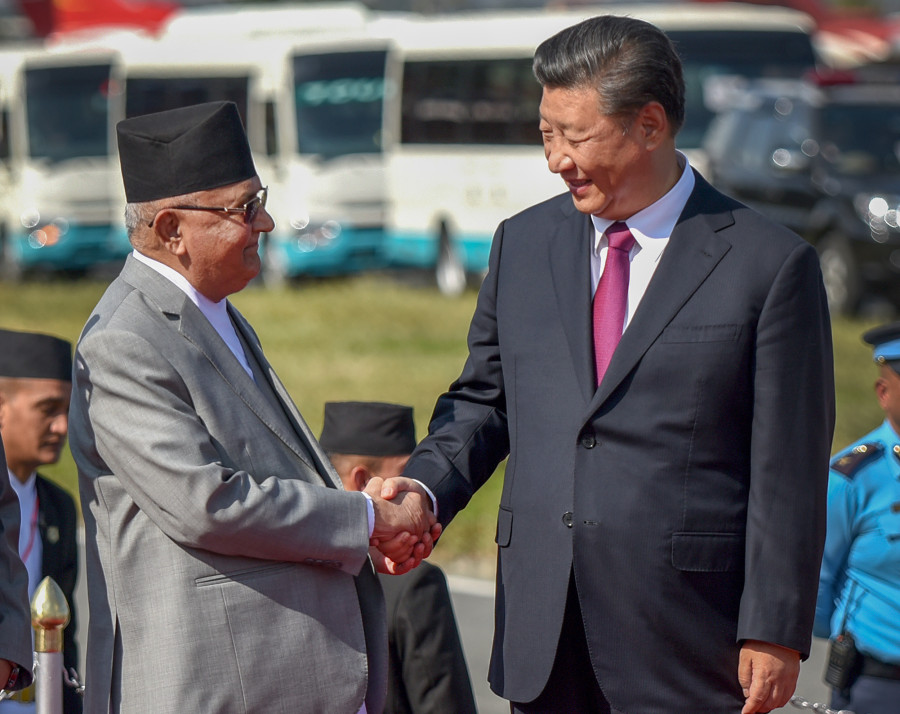National
Nepal and China elevate bilateral ties to a ‘strategic partnership’ but no one’s certain what that entails
Analysts believe that a strategic partnership has security and military components but caution against a hasty interpretation.
Anil Giri
On Saturday, the day Chinese President Xi Jinping landed in Kathmandu for a two-day state visit, three Nepali papers, including the Post’s sister paper Kantipur, published an article authored by him, in which the Chinese leader said that China wants to forge “a strategic partnership” with Nepal.
A joint communiqué issued after the conclusion of Xi’s visit on Sunday categorically mentioned that both sides have “decided to, on the basis of the Five Principles of Peaceful Coexistence, Charter of the United Nations and principles of good neighbourliness, elevate Nepal-China Comprehensive Partnership of Cooperation Featuring Ever-lasting Friendship to Strategic Partnership of Cooperation.”
This is the first time that a joint communiqué issued by Nepal and China has ever mentioned the phrase “strategic partnership”, leaving experts and foreign policy watchers confused as to what exactly this means for Nepal and whether the phrase has any “security and military” connotations.
Repeated attempts to reach Foreign Minister Pradeep Gyawali and Rajan Bhattarai, foreign affairs advisor to Prime Minister KP Sharma Oli, failed as they did not respond to calls and messages from the Post.
Though government officials refrained from commenting on what exactly this strategic partnership meant, some agreements reached with China during Xi visit entail both security and military components.
“As Nepal has signed a treaty on mutual legal assistance with China, it must have some security dimension,” said Sridhar Khatri, former executive director of the South Asia Centre for Policy Studies. The text of the Mutual Legal Assistance treaty with China has yet to be released to the public.
The joint communiqué says that China will train Nepali law enforcement officials, organise exchange visits for security personnel and hold joint training exercises between the two armies. Over the next three years, China will offer 100 training opportunities to Nepali law enforcement officers each year.
Former Nepali diplomats involved in negotiations with China said that the northern neighbour has long been urging Nepal to forge a strategic partnership but Nepal had always taken a cautious approach and decided instead in favour of a “comprehensive partnership”.
During the visit of Prime Minister KP Sharma Oli to China in 2016, Chinese President Xi had proposed a strategic partnership but Oli had refused, as such a partnership could have military connotations, according to the diplomats.
“We were cautious about using the phrase strategic partnership when Prime Minster Oli met with President Xi in Beijing, fearing it could have military and security implications,” said former Nepali ambassador to China Mahesh Maskey. “Later, we saw that other South Asian neighbours like India, Bangladesh and Sri Lanka had also started forging strategic partnerships with China, so we included the term this time in our joint communication. I think it does not include any military or security components.”
Security analysts, however, believe that there are always national security implications when it comes to bilateral relations.
“Chinese President Xi’s two-day visit has sophisticated the Nepal-China relationship, which is full of opportunities but also geopolitical challenges,” said former Nepal Army general Binoj Basnyat. “Political decisions and agreements that will further the relationship are encouraging but political decision-making alone cannot handle matters related to security and sovereignty.”
Geopolitical trends have not only economic benefits but also geostrategic security complexities, according to Basnyat.
However, foreign policy analyst Khatri cautioned against reading too much into the phrase.
“Are we looking at the whole tree or just its branches and roots?” said Khatri. “We cannot draw a conclusion from two speeches delivered at a banquet and the text of a joint communiqué. We don’t know everything about what was discussed during the visit for us to draw a conclusion.”




 10.12°C Kathmandu
10.12°C Kathmandu














